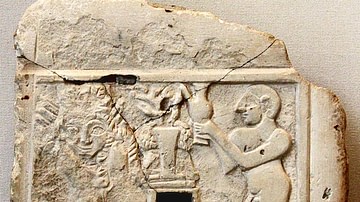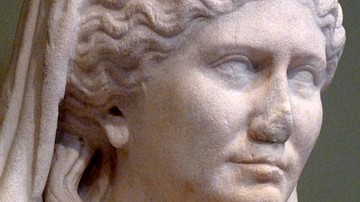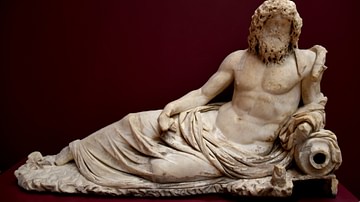Search
Search Results

Definition
Psyche
Psyche was the goddess of the soul in ancient Greek and Roman mythology. Born a mortal woman, her beauty rivaled that of Aphrodite (Venus) and inspired the love of Aphrodite's son, Eros, god of desire. After completing a series of seemingly...

Definition
Ninhursag
Ninhursag (also Ninhursaga) is the Sumerian Mother Goddess and one of the oldest and most important in the Mesopotamian Pantheon. She is known as the Mother of the Gods and Mother of Men for her part in creating both divine and mortal entities...

Definition
Angkor Wat
Angkor Wat is a temple complex in the province of Siem Reap, Cambodia originally dedicated to the Hindu god Vishnu in the 12th century CE. It is among the largest religious buildings ever created, second only to the Temple of Karnak at Thebes...

Definition
Helios
Helios (also Helius) was the god of the Sun in Greek mythology. Helios rode a golden chariot which brought the Sun across the skies each day from the east (Ethiopia) to the west (Hesperides). Helios was famously the subject of the Colossus...

Definition
Cult of the Supreme Being
The Cult of the Supreme Being was a deistic cult established by Maximilien Robespierre (1758-1794) during the French Revolution (1789-1799). Its purpose was to replace Roman Catholicism as the state religion of France and to undermine the...

Definition
Cybele
History verifies the importance of religion not only on a society's development but also on its survival; in this respect the Romans were no different than other ancient civilizations. During the formative years of the Roman Republic, especially...

Definition
Oceanus
Oceanus (also Okeanos) was the eldest of the Titans and a son of Uranus (Heaven) and Gaia (Earth) in Greek mythology. He was the god and personification of the freshwater river Oceanus, which was thought to encircle the earth and was said...

Definition
Bes
Bes is the ancient Egyptian god of childbirth, fertility, sexuality, humor, and war, but served primarily as a protector god of pregnant women and children. He is regularly depicted as a dwarf with large ears, long-haired and bearded, with...

Definition
Mayflower
The Mayflower is the name of the cargo ship that brought the Puritan separatists (known as pilgrims) to North America in 1620 CE. It was a type of sailing ship known as a carrack with three masts with square-rigged sails on the main and foremast...

Definition
Gula
Gula (also known as Ninkarrak) is the Sumerian goddess of healing and patroness of doctors, healing arts, and medical practices. She is first attested to in the Ur III Period (2047-1750 BCE) where she is referenced as a great goddess of health...